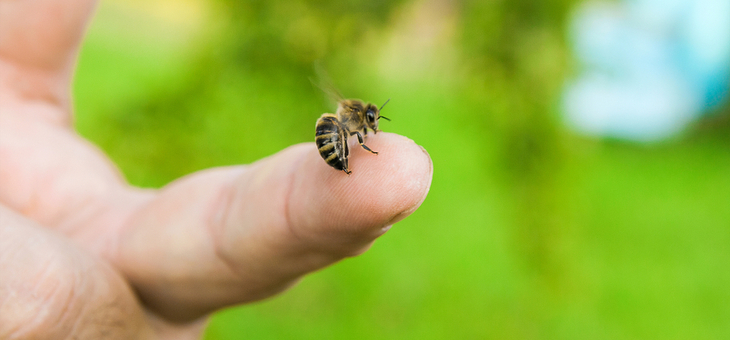Honeybee venom offers hope for the treatment of previously untreatable breast cancers, thanks to trailblazing Australian research.
Dr Ciara Duffy conducted a study at Perth’s Harry Perkins Institute of Medical Research for her PhD an found the venom quickly killed aggressive breast cancer cells.
ABC News reports that Dr Duffy hopes to develop a treatment for triple-negative breast cancer, which makes up to 15 per cent of all breast cancers and for which there are currently “no clinically effective targeted therapies”.
She also discovered that the venom’s main component, combined with chemotherapy drugs, was “extremely efficient” at reducing tumour growth in mice.
“We found that the venom from honeybees is remarkably effective in killing some of these really aggressive breast cancer cells at concentrations that aren’t as damaging to normal cells,” Dr Duffy said.
She harvested bee venom from Western Australia, Ireland and England, revealing a specific concentration of honeybee venom induced the death of cancer cells without unduly damaging healthy cells.
The results were published in the international journal, Nature Precision Oncology.
The crucial part of bee venom is called melittin.
“What melittin does is it actually enters the surface, or the plasma membrane, and forms holes or pores and it just causes the cell to die,” Dr Duffy said.
Twenty minutes after application, melittin had another effect.
“We found it was interfering with the main messaging or cancer-signalling pathways that are fundamental for the growth and replication of cancer cells,” she said.
“No-one had previously compared the effects of honeybee venom or melittin across all of the different subtypes of breast cancer and normal cells.
“We found both honeybee venom and melittin significantly, selectively and rapidly reduced the viability of triple-negative breast cancer and HER2-enriched breast cancer cells.
“The venom was extremely potent.
“We found that melittin can completely destroy cancer cell membranes within 60 minutes.”
Not every bee can sting the Big C.
“I found that the European honeybee in Australia, Ireland and England produced almost identical effects in breast cancer compared to normal cells. However, bumblebee venom was unable to induce cell death even at very high concentrations,” Dr Duffy said.
In a trial with mice, melittin worked with existing chemotherapy drugs such as docetaxel by creating holes in breast cancer membranes, allowing the drugs to enter cells to reduce the size of tumours.
Western Australia’s chief scientist, Professor Peter Klinken, described the research as a significant development.
“This is an incredibly exciting observation that melittin, a major component of honeybee venom, can suppress the growth of deadly breast cancer cells, particularly triple-negative breast cancer,” Prof. Klinken said.
“Significantly, this study demonstrates how melittin interferes with signalling pathways within breast cancer cells to reduce cell replication. It provides another wonderful example of where compounds in nature can be used to treat human diseases”, he said.
Dr Duffy emphasised the need for further research.
“There’s a long way to go in terms of how we would deliver it in the body and, you know, looking at toxicities and maximum tolerated doses before it ever went further,” she said.
The first study of bee venom was published in Nature in 1950, where the venom reduced the growth of tumours in plants. However, Dr Duffy said it was only in the past 20 years that the effects of honeybee venom on different cancers has been investigated.
Healthline says bee venom was previously used to reduce inflammation and in the treatment of chronic illnesses, but some previous research about its efficacy was “lacking or conflicting”.
Stinging facts
- Bee venom is a colourless, acidic liquid. Bees excrete it through their stingers into a target when they feel threatened.
- It contains both anti-inflammatory and inflammatory compounds, including enzymes, sugars, minerals, and amino acids.
- Melittin — a compound that consists of 26 amino acids – comprises about 50 per cent of the dry weight of the venom and has been shown to have anti-viral, anti-bacterial, and anti-cancer effects in some studies.
- Bee venom also contains the peptides apamin and adolapin. Although they act as toxins, they have been shown to possess anti-inflammatory and pain-relieving properties.
- It also contains phospholipase A2, an enzyme and major allergen that causes inflammation and cell damage. Nevertheless, according to some research, the enzyme may also have anti-inflammatory and immune-protective effects.
- Apitherapy is an alternative medicine practice that uses bee products — including their venom — to treat and prevent illnesses, pain, and more.
- Although bee venom has recently experienced a surge in popularity, bee-venom therapy has been used in traditional medicine practices for thousands of years.
- Bee venom is used in several ways and available in many forms. For example, it’s added to products like extracts, supplements, moisturisers, and serums.
- You can purchase bee-venom products, such as moisturisers, lotions, and lozenges online or in specialty stores.
Breast cancer facts
- Breast cancer is the most commonly occurring cancer in women worldwide.
- It is the second most common cause of death from cancer among females.
- Triple-negative breast cancer (TNBC) accounts for up to 15 per cent of all breast cancers.
- There are currently no clinically effective targeted treatments for TNBC.
Sources: healthline.com; Harry Perkins Institute of Medical Research.
Are you amazed by the research being conducted at universities? Do the staff cuts at universities alarm you?
If you enjoy our content, don’t keep it to yourself. Share our free eNews with your friends and encourage them to sign up.
Related articles:
https://www.yourlifechoices.com.au/news/cancercausing-diet-identified
https://www.yourlifechoices.com.au/health/news/cancer-treatment-gamechanging
https://www.yourlifechoices.com.au/health/your-health/cancers-left-better-undiscovered

